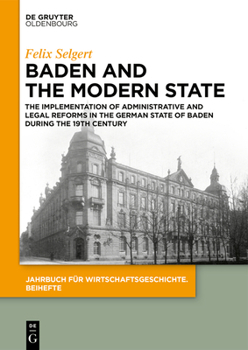Baden and the Modern State: The Implementation of Administrative and Legal Reforms in the German State of Baden During the 19th Century
The bureaucracy's commitment to the public good and predictable decision making processes is an important prerequisite of economic growth. There are, however, only few studies that ask how such an efficient bureaucracy was established. The main objective of this book is to close this gap by exploring the transformation of a rent-seeking bureaucracy into a modern Weberian administration in the Grand-Duchy of Baden during the first half of the 19th century.
In doing so, the study asks how rules and regulations that governed employment dismissal, promotion and remuneration of bureaucrats shaped the latter's incentives to commit to the public good and predictable decision making processes. The book provides a detailed case study of local bureaucrats, called district magistrates (Amtm nner) in the German state of Baden during the late 18th and the first half of the 19th century. District magistrates were a focal group since they managed daily administrative tasks and provided justice at the local level. Binding district magistrates' decision making processes to clear-cut rules and making them more predictable was therefore a crucial complement to the technological and cultural changes that brought about the industrial revolution.
In doing so, the study asks how rules and regulations that governed employment dismissal, promotion and remuneration of bureaucrats shaped the latter's incentives to commit to the public good and predictable decision making processes. The book provides a detailed case study of local bureaucrats, called district magistrates (Amtm nner) in the German state of Baden during the late 18th and the first half of the 19th century. District magistrates were a focal group since they managed daily administrative tasks and provided justice at the local level. Binding district magistrates' decision making processes to clear-cut rules and making them more predictable was therefore a crucial complement to the technological and cultural changes that brought about the industrial revolution.
Format:Paperback
Language:English
ISBN:311060079X
ISBN13:9783110600797
Release Date:August 2018
Publisher:de Gruyter Oldenbourg
Length:195 Pages
Weight:0.71 lbs.
Dimensions:0.4" x 6.7" x 9.6"
Customer Reviews
0 rating





